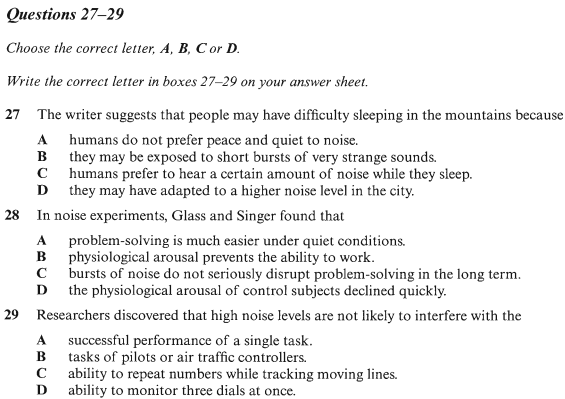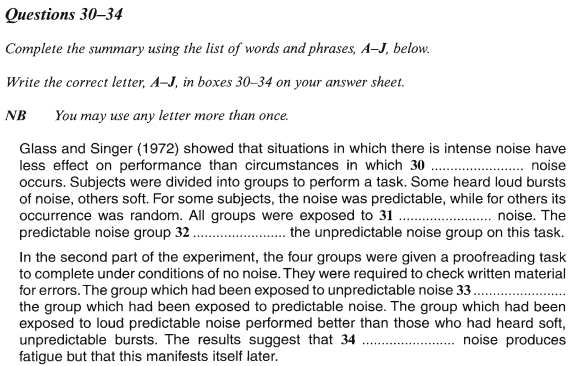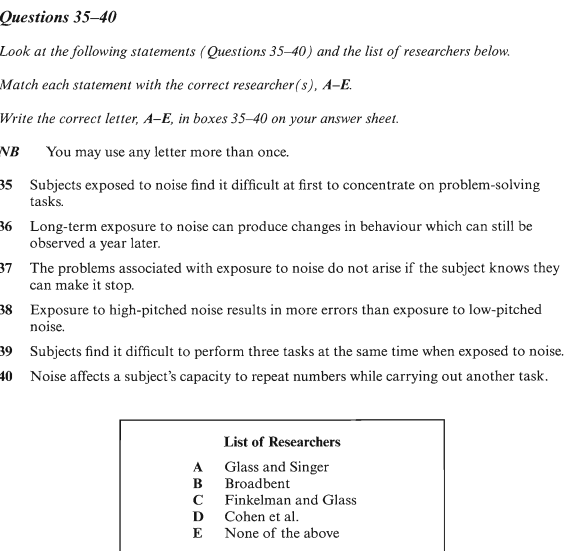剑桥雅思7阅读:Test4雅思阅读PASSAGE 3真题+答案+解析
发布时间:2021-01-05 关键词:剑桥雅思7阅读:Test4雅思阅读PASSAGE 3真题+答案+解析剑桥雅思7阅读:Test4雅思阅读PASSAGE 3真题+答案+解析,我们一起来看看吧!
READING PASSAGE 3
You should spend about 20 minutes on Questions 27- 40, which are based on Reading Passage 3below.
EFFECTS OF NOISE
In general, it is plausible to suppose that we should prefer peace and quiet to noise. Andyet most of us have had the experience of having to adjust to sleeping in the mountains orthe countryside because it was initially 'too quiet', an experience that suggests that
humans are capable of adapting to a wide range of noise levels. Research supports thisview. For example, Glass and Singer (1972) exposed people to short bursts of very loudnoise and then measured their ability to work out problems and their physiological
reactions to the noise. The noise was quite disruptive at first, but after about four minutesthe subjects were doing just as well on their tasks as control subjects who were not ex posedto noise. Their physiological arousal also declined quickly to the same levels as those ofthe control subjects.
But there are limits to adaptation and loud noise becomes more troublesome if the personis required to concentrate on more than one task. For example, high noise levels interferedwith the performance of subjects who were required to monitor three dials at a time, a
task not unlike that of an aeroplane pilot or an air-traffic controller (Broadbent, 1957).Similarly, noise did not affect a subject's ability to track a moving line with a steeringwheel, but it did interfere with the subject's ability to repeat numbers while tracking(Finkelman and Glass, 1970).
Probably the most significant finding from research on noise is that its predictability ismore important than how loud it is. We are much more able to tune out' chronic
background noise, even if it is quite loud, than to work under circumstances with
unexpected intrusions of noise. In the Glass and Singer study, in which subjects were
exposed to bursts of noise as they worked on a task, some subjects heard loud bursts andothers heard soft bursts. For some subjects, the bursts were spaced exactly one minuteapart (predictable noise); others heard the same amount of noise overall, but the bursts
occurred at random intervals (unpredictable noise). Subjects reported finding the
predictable and unpredictable noise equally annoying, and all subjects performed at aboutthe same level during the noise portion of the experiment. But the different noise
conditions had quite different after-effects when the subjects were required to proofreadwritten material under conditions of no noise. As shown in Table l the unpredictable
noise produced more errors in the later proofreading task than predictable noise; and soft,unpredictable noise actually produced slightly more errors on this task than the loud,
predictable noise.
Apparently, unpredictable noise produces more fatigue than predictable noise, but it takesa while for this fatigue to take its toll on performance.
Predictability is not the only variable that reduces or eliminates the negative effects of
noise. Another is control. If the individual knows that he or she can control the noise, thisseems to eliminate both its negative effects at the time and its after-effects. This is true evenif the individual never actually exercises his or her option to turn the noise off (Glass andSinger, 1972). Just the knowledge that one has control is sufficient.
The studies discussed so far exposed people to noise for only short periods and only
transient effects were studied. But the major worry about noisy environments is that livingday after day with chronic noise may produce serious, lasting effects. One study, suggestingthat this worry is a realistic one, compared elementary school pupils who attended schoolsnear Los Angeles's busiest airport with students who attended schools in quiet
neighbourhoods (Cohen et al., 1980). It was found that children from the noisy schoolshad higher blood pressure and were more easily distracted than those who attended thequiet schools. Moreover, there was no evidence of adaptability to the noise. In fact, thelonger the children had attended the noisy schools, the more distractible they became. Theeffects also seem to be long lasting. A follow-up study showed that children who were
moved to less noisy classrooms still showed greater distractibility one year later than
students who had always been in the quiet schools (Cohen et al, 1981). It should be notedthat the two groups of children had been carefully matched by the investigators so thatthey were comparable in age, ethnicity, race, and social class.




体裁:说明文
主要内容:介绍了不同形态噪音对人类影响的差异及后果
结构:
第1段:人们能适应持续时间较长的噪音
第2段:人们对噪音适应的局限
第3段:噪音的可预测性对人类适应能力的影响
第4段:不可预测的噪音较使人产生更强的疲惫感
第5段:噪音的可控制性所带来的影响
Questions27-29l题型归类:Multiple Choice
这类题型属于细节题型,解答此类题型可以直接根据题目中的定位词找到原文的范围,再归纳出相关信息,根据此信息在选项中排查,确定正确答案。当题干较短时,考生可以运用排除法,得出答案。
Questions30-34l题型归类:Summary
这类题型属于细节题,考查考生在文章中提取相关信息的能力。同时,由于题目是对整篇文章或者文章中部分内容的总结,把握文章的叙述脉络对于解题也有很大帮助。具体到解题方法时,应尤其关注空格前后的信息在原文的重现。
考题解析Questions35-40题型归类:Matching
这种类型的题目属于细节题型,重点考查提取信息的能力。遇到人名和观点的配对,可以先把选项中的人名在文章中划出,然后根据题目中的定位词回文章划线处的上下文仔细比对,从而确定答案。




